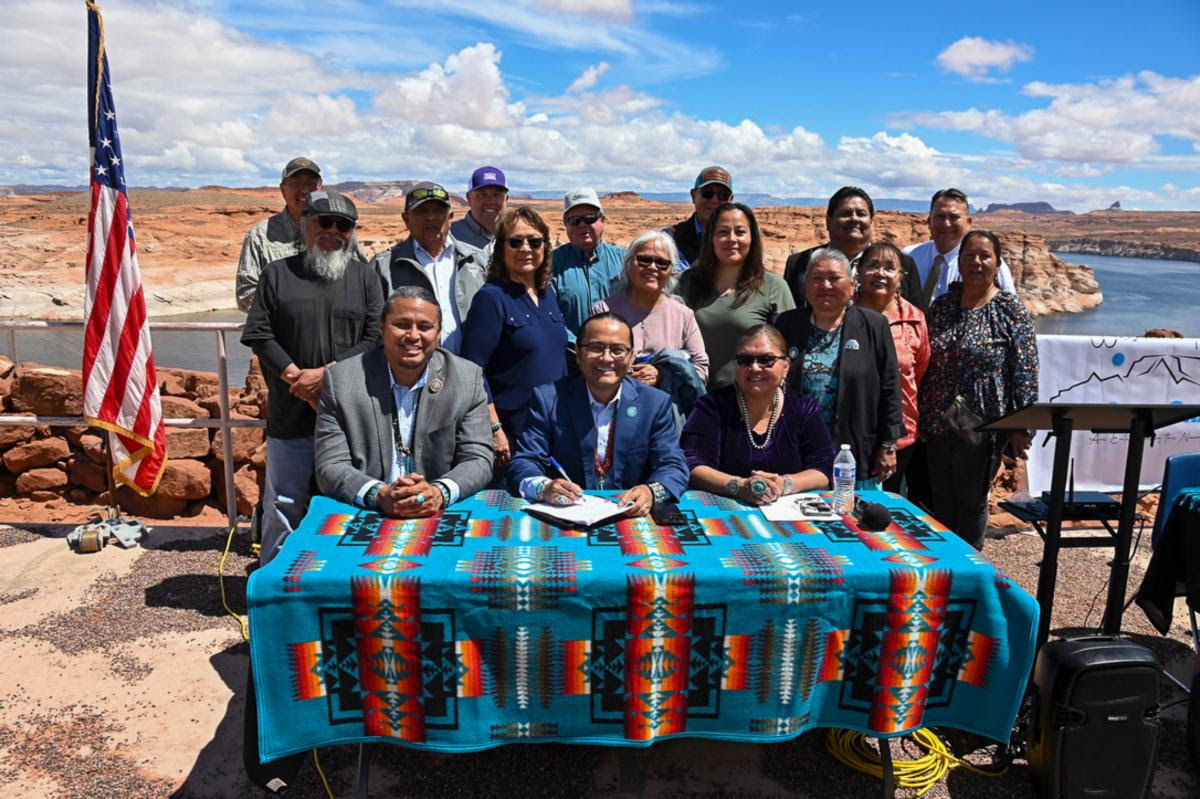
- Details
- By Native News Online Staff
On Wednesday, the 25th Navajo Nation Council joined chapter leaders, engineers, and community members to celebrate the launch of the $43 million LeChee Water System Improvement Project, aimed at delivering clean, reliable water to the LeChee Chapter and neighboring areas.
Council Delegates Helena Nez Begay and Casey Allen Johnson were joined by Navajo Nation President Dr. Buu Nygren, Natural Resources Director Mike Halona, and Water Resources Manager Jason John for the official signing ceremony.
“This was never just about water,” said Delegate Nez Begay. “It was about keeping promises to our elders and building a future where our children don’t have to haul water just to cook or bathe. I’ve lived this struggle—I know our people deserve better.”
The project utilizes the Lake Powell water intake previously used by the Navajo Generating Station (NGS), now owned by the Navajo Nation. Phase 1 includes a new membrane water treatment plant, pump stations, wastewater systems, storage tanks, and 31,000 feet of pipeline, connecting LeChee to a sustainable water supply.
“This water project will create opportunity for our Western Agency,” said Delegate Johnson, “it will provide access to clean drinking water to our rural western communities who need running water and it will help in economic growth within the Western Agency. I am thankful for those who are involved in this project and I’m looking forward for the future of our people.”
LeChee’s move toward water independence has been two decades in the making. The 2021 passage of the Western Navajo Pipeline legislation by the 24th Council and President Jonathan Nez helped secure key funding.
Former leaders including Chapter President Joanne Yazzie, Speaker Seth Damon, and Council Delegates Dwight Weatherspoon and Paul Begay were recognized for their early support.
More than a vital infrastructure upgrade, the project lays groundwork for regional development and aligns with pending federal water rights legislation.
With construction now underway, the LeChee Water System represents a major step toward self-reliance and opportunity for the Diné of the Western Agency.
More Stories Like This
Native News Weekly (August 25, 2024): D.C. BriefsNavajo Nation Mourns the Passing of Former Vice President Rex Lee Jim
Deb Haaland Earns Endorsement From Communications Workers of America Local 7076
University Soccer Standout Leads by Example
Two Native Americans Named to Democratic Congressional Campaign Committee's“Red to Blue” Program
Help us defend tribal sovereignty.
At Native News Online, our mission is rooted in telling the stories that strengthen sovereignty and uplift Indigenous voices — not just at year’s end, but every single day.
Because of your generosity last year, we were able to keep our reporters on the ground in tribal communities, at national gatherings and in the halls of Congress — covering the issues that matter most to Indian Country: sovereignty, culture, education, health and economic opportunity.
That support sustained us through a tough year in 2025. Now, as we look to the year ahead, we need your help right now to ensure warrior journalism remains strong — reporting that defends tribal sovereignty, amplifies Native truth, and holds power accountable.
 The stakes couldn't be higher. Your support keeps Native voices heard, Native stories told and Native sovereignty defended.
The stakes couldn't be higher. Your support keeps Native voices heard, Native stories told and Native sovereignty defended.
Stand with Warrior Journalism today.
Levi Rickert (Potawatomi), Editor & Publisher


